Addressing High Absence: Causes and Proactive Measures for Companies
VerifiedAdded on 2023/06/18
|11
|3610
|209
Essay
AI Summary
This essay delves into the pervasive issue of high employee absence in organizations, examining its underlying causes such as bullying, low workplace morale, stress, better opportunities, and disengagement. It highlights the negative impact of absenteeism on organizational productivity and efficiency. Furthermore, the essay proposes proactive measures like building a culture of well-being, providing call-out mechanisms, and offering employees control over their work schedules to mitigate these issues. The report also examines the role of motivational theories, specifically Vroom's Expectancy Theory, Adam's Equity Theory, and Locke's Goal Setting Theory, in enhancing employee motivation and reducing absence. The document is available on Desklib, where students can find additional resources and solved assignments.
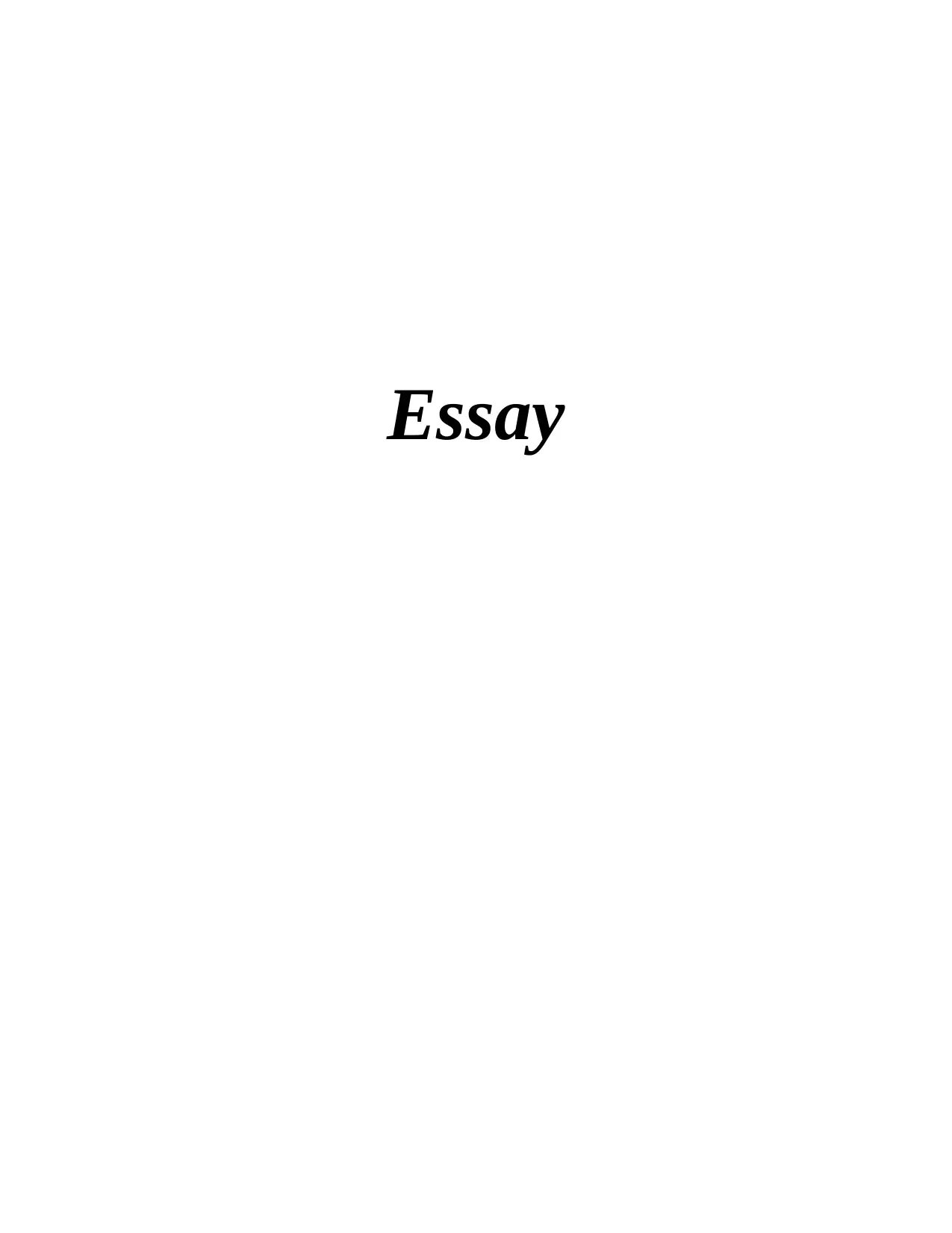
Essay
Paraphrase This Document
Need a fresh take? Get an instant paraphrase of this document with our AI Paraphraser
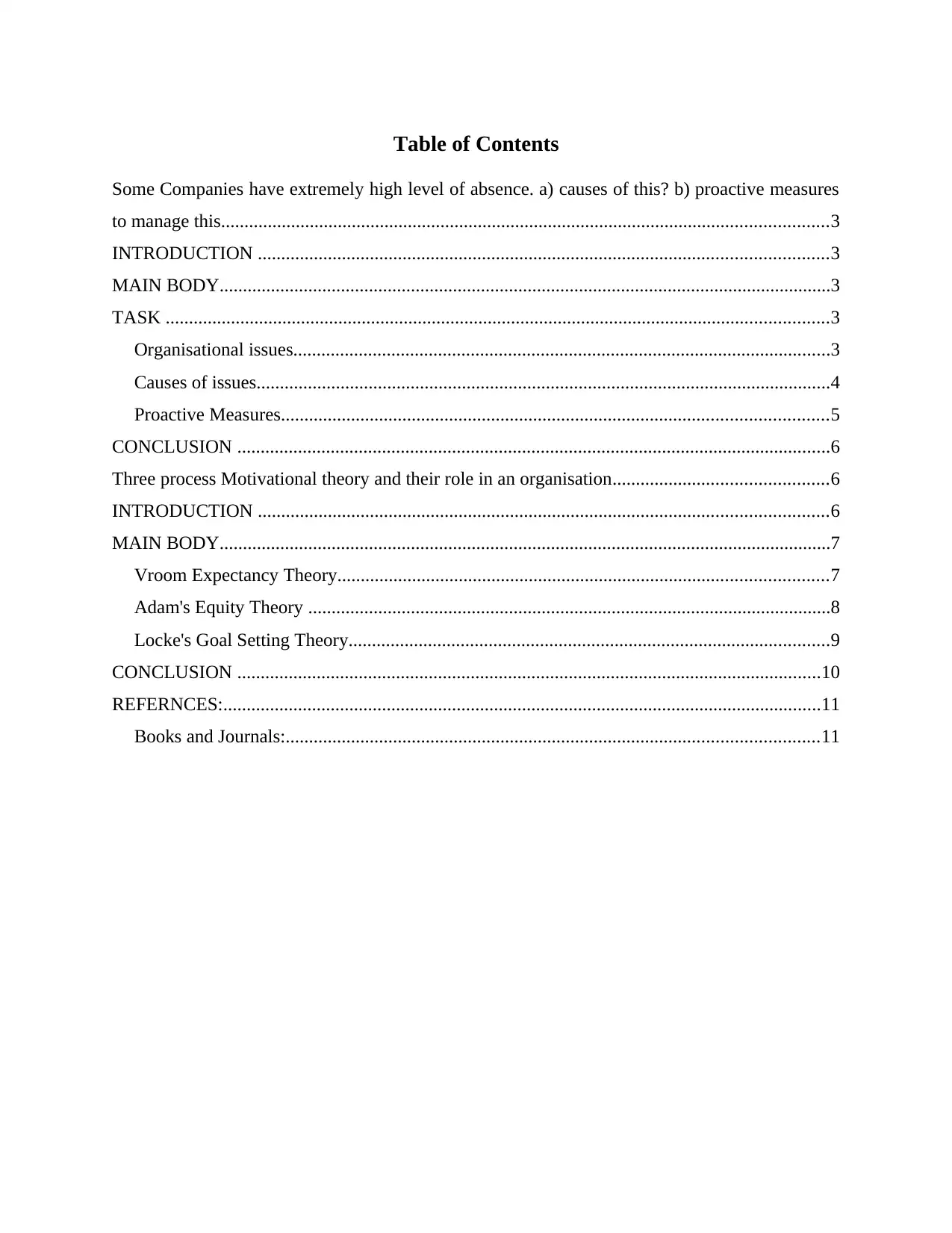
Table of Contents
Some Companies have extremely high level of absence. a) causes of this? b) proactive measures
to manage this..................................................................................................................................3
INTRODUCTION ..........................................................................................................................3
MAIN BODY...................................................................................................................................3
TASK ..............................................................................................................................................3
Organisational issues...................................................................................................................3
Causes of issues...........................................................................................................................4
Proactive Measures.....................................................................................................................5
CONCLUSION ...............................................................................................................................6
Three process Motivational theory and their role in an organisation..............................................6
INTRODUCTION ..........................................................................................................................6
MAIN BODY...................................................................................................................................7
Vroom Expectancy Theory.........................................................................................................7
Adam's Equity Theory ................................................................................................................8
Locke's Goal Setting Theory.......................................................................................................9
CONCLUSION .............................................................................................................................10
REFERNCES:................................................................................................................................11
Books and Journals:..................................................................................................................11
Some Companies have extremely high level of absence. a) causes of this? b) proactive measures
to manage this..................................................................................................................................3
INTRODUCTION ..........................................................................................................................3
MAIN BODY...................................................................................................................................3
TASK ..............................................................................................................................................3
Organisational issues...................................................................................................................3
Causes of issues...........................................................................................................................4
Proactive Measures.....................................................................................................................5
CONCLUSION ...............................................................................................................................6
Three process Motivational theory and their role in an organisation..............................................6
INTRODUCTION ..........................................................................................................................6
MAIN BODY...................................................................................................................................7
Vroom Expectancy Theory.........................................................................................................7
Adam's Equity Theory ................................................................................................................8
Locke's Goal Setting Theory.......................................................................................................9
CONCLUSION .............................................................................................................................10
REFERNCES:................................................................................................................................11
Books and Journals:..................................................................................................................11
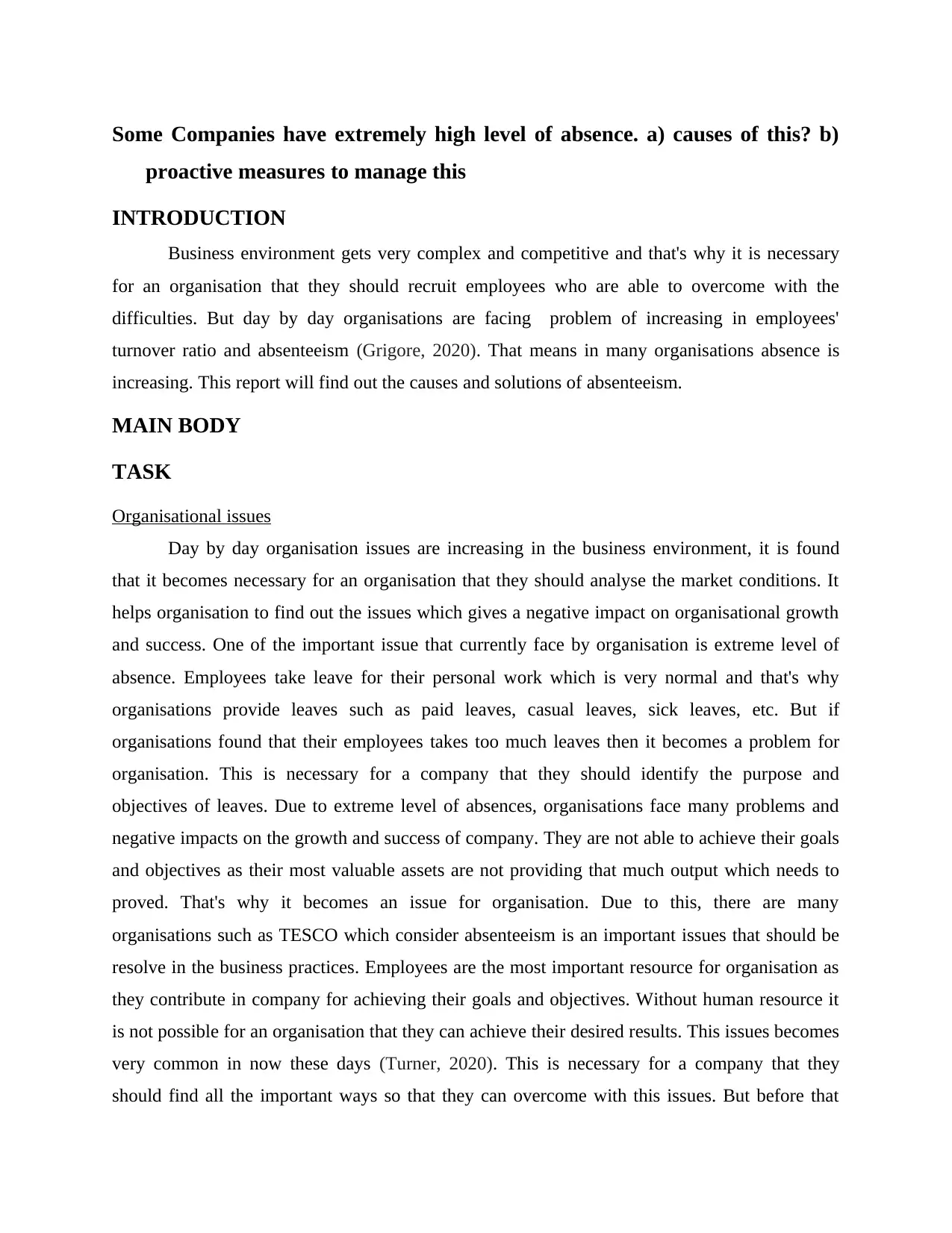
Some Companies have extremely high level of absence. a) causes of this? b)
proactive measures to manage this
INTRODUCTION
Business environment gets very complex and competitive and that's why it is necessary
for an organisation that they should recruit employees who are able to overcome with the
difficulties. But day by day organisations are facing problem of increasing in employees'
turnover ratio and absenteeism (Grigore, 2020). That means in many organisations absence is
increasing. This report will find out the causes and solutions of absenteeism.
MAIN BODY
TASK
Organisational issues
Day by day organisation issues are increasing in the business environment, it is found
that it becomes necessary for an organisation that they should analyse the market conditions. It
helps organisation to find out the issues which gives a negative impact on organisational growth
and success. One of the important issue that currently face by organisation is extreme level of
absence. Employees take leave for their personal work which is very normal and that's why
organisations provide leaves such as paid leaves, casual leaves, sick leaves, etc. But if
organisations found that their employees takes too much leaves then it becomes a problem for
organisation. This is necessary for a company that they should identify the purpose and
objectives of leaves. Due to extreme level of absences, organisations face many problems and
negative impacts on the growth and success of company. They are not able to achieve their goals
and objectives as their most valuable assets are not providing that much output which needs to
proved. That's why it becomes an issue for organisation. Due to this, there are many
organisations such as TESCO which consider absenteeism is an important issues that should be
resolve in the business practices. Employees are the most important resource for organisation as
they contribute in company for achieving their goals and objectives. Without human resource it
is not possible for an organisation that they can achieve their desired results. This issues becomes
very common in now these days (Turner, 2020). This is necessary for a company that they
should find all the important ways so that they can overcome with this issues. But before that
proactive measures to manage this
INTRODUCTION
Business environment gets very complex and competitive and that's why it is necessary
for an organisation that they should recruit employees who are able to overcome with the
difficulties. But day by day organisations are facing problem of increasing in employees'
turnover ratio and absenteeism (Grigore, 2020). That means in many organisations absence is
increasing. This report will find out the causes and solutions of absenteeism.
MAIN BODY
TASK
Organisational issues
Day by day organisation issues are increasing in the business environment, it is found
that it becomes necessary for an organisation that they should analyse the market conditions. It
helps organisation to find out the issues which gives a negative impact on organisational growth
and success. One of the important issue that currently face by organisation is extreme level of
absence. Employees take leave for their personal work which is very normal and that's why
organisations provide leaves such as paid leaves, casual leaves, sick leaves, etc. But if
organisations found that their employees takes too much leaves then it becomes a problem for
organisation. This is necessary for a company that they should identify the purpose and
objectives of leaves. Due to extreme level of absences, organisations face many problems and
negative impacts on the growth and success of company. They are not able to achieve their goals
and objectives as their most valuable assets are not providing that much output which needs to
proved. That's why it becomes an issue for organisation. Due to this, there are many
organisations such as TESCO which consider absenteeism is an important issues that should be
resolve in the business practices. Employees are the most important resource for organisation as
they contribute in company for achieving their goals and objectives. Without human resource it
is not possible for an organisation that they can achieve their desired results. This issues becomes
very common in now these days (Turner, 2020). This is necessary for a company that they
should find all the important ways so that they can overcome with this issues. But before that
⊘ This is a preview!⊘
Do you want full access?
Subscribe today to unlock all pages.

Trusted by 1+ million students worldwide
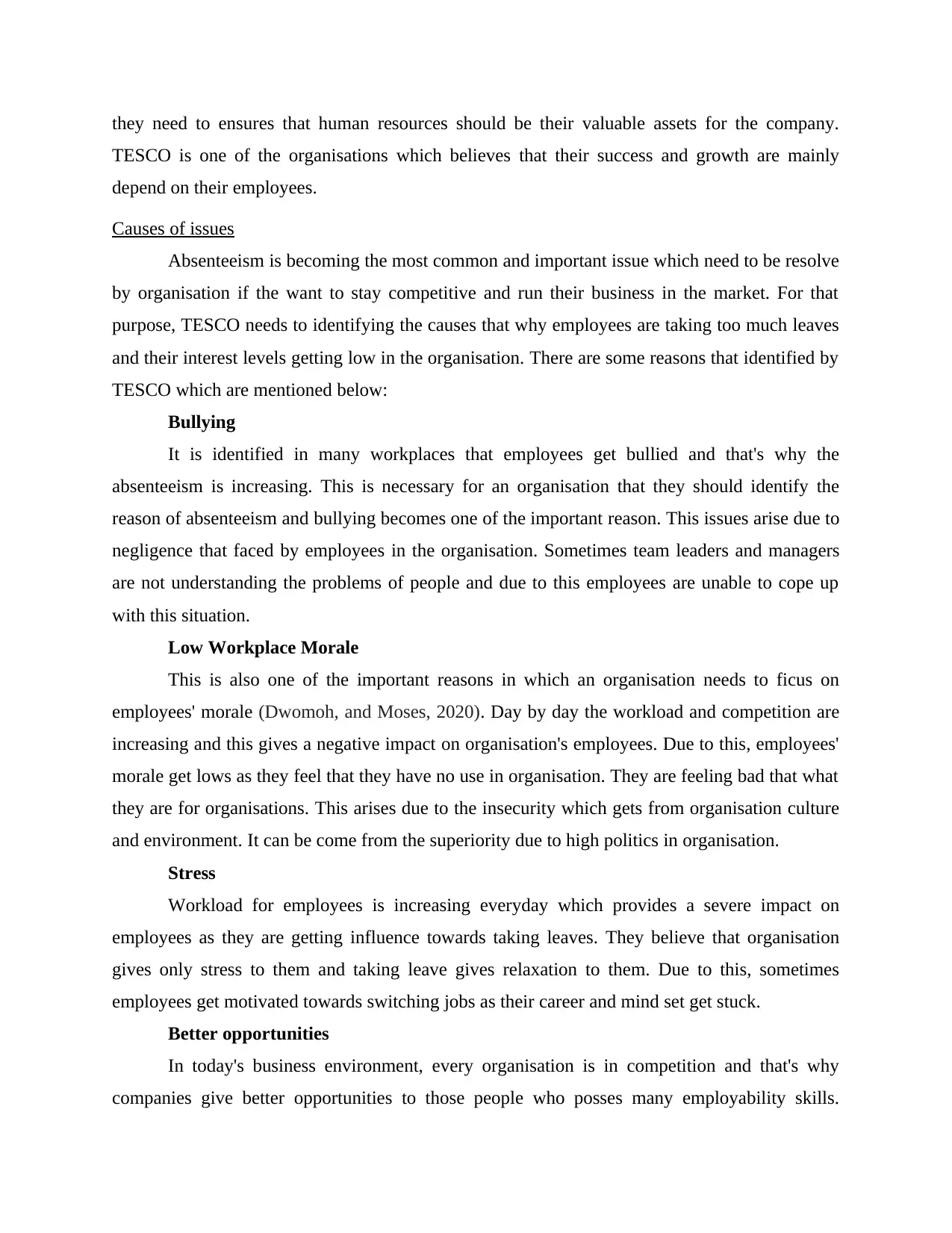
they need to ensures that human resources should be their valuable assets for the company.
TESCO is one of the organisations which believes that their success and growth are mainly
depend on their employees.
Causes of issues
Absenteeism is becoming the most common and important issue which need to be resolve
by organisation if the want to stay competitive and run their business in the market. For that
purpose, TESCO needs to identifying the causes that why employees are taking too much leaves
and their interest levels getting low in the organisation. There are some reasons that identified by
TESCO which are mentioned below:
Bullying
It is identified in many workplaces that employees get bullied and that's why the
absenteeism is increasing. This is necessary for an organisation that they should identify the
reason of absenteeism and bullying becomes one of the important reason. This issues arise due to
negligence that faced by employees in the organisation. Sometimes team leaders and managers
are not understanding the problems of people and due to this employees are unable to cope up
with this situation.
Low Workplace Morale
This is also one of the important reasons in which an organisation needs to ficus on
employees' morale (Dwomoh, and Moses, 2020). Day by day the workload and competition are
increasing and this gives a negative impact on organisation's employees. Due to this, employees'
morale get lows as they feel that they have no use in organisation. They are feeling bad that what
they are for organisations. This arises due to the insecurity which gets from organisation culture
and environment. It can be come from the superiority due to high politics in organisation.
Stress
Workload for employees is increasing everyday which provides a severe impact on
employees as they are getting influence towards taking leaves. They believe that organisation
gives only stress to them and taking leave gives relaxation to them. Due to this, sometimes
employees get motivated towards switching jobs as their career and mind set get stuck.
Better opportunities
In today's business environment, every organisation is in competition and that's why
companies give better opportunities to those people who posses many employability skills.
TESCO is one of the organisations which believes that their success and growth are mainly
depend on their employees.
Causes of issues
Absenteeism is becoming the most common and important issue which need to be resolve
by organisation if the want to stay competitive and run their business in the market. For that
purpose, TESCO needs to identifying the causes that why employees are taking too much leaves
and their interest levels getting low in the organisation. There are some reasons that identified by
TESCO which are mentioned below:
Bullying
It is identified in many workplaces that employees get bullied and that's why the
absenteeism is increasing. This is necessary for an organisation that they should identify the
reason of absenteeism and bullying becomes one of the important reason. This issues arise due to
negligence that faced by employees in the organisation. Sometimes team leaders and managers
are not understanding the problems of people and due to this employees are unable to cope up
with this situation.
Low Workplace Morale
This is also one of the important reasons in which an organisation needs to ficus on
employees' morale (Dwomoh, and Moses, 2020). Day by day the workload and competition are
increasing and this gives a negative impact on organisation's employees. Due to this, employees'
morale get lows as they feel that they have no use in organisation. They are feeling bad that what
they are for organisations. This arises due to the insecurity which gets from organisation culture
and environment. It can be come from the superiority due to high politics in organisation.
Stress
Workload for employees is increasing everyday which provides a severe impact on
employees as they are getting influence towards taking leaves. They believe that organisation
gives only stress to them and taking leave gives relaxation to them. Due to this, sometimes
employees get motivated towards switching jobs as their career and mind set get stuck.
Better opportunities
In today's business environment, every organisation is in competition and that's why
companies give better opportunities to those people who posses many employability skills.
Paraphrase This Document
Need a fresh take? Get an instant paraphrase of this document with our AI Paraphraser
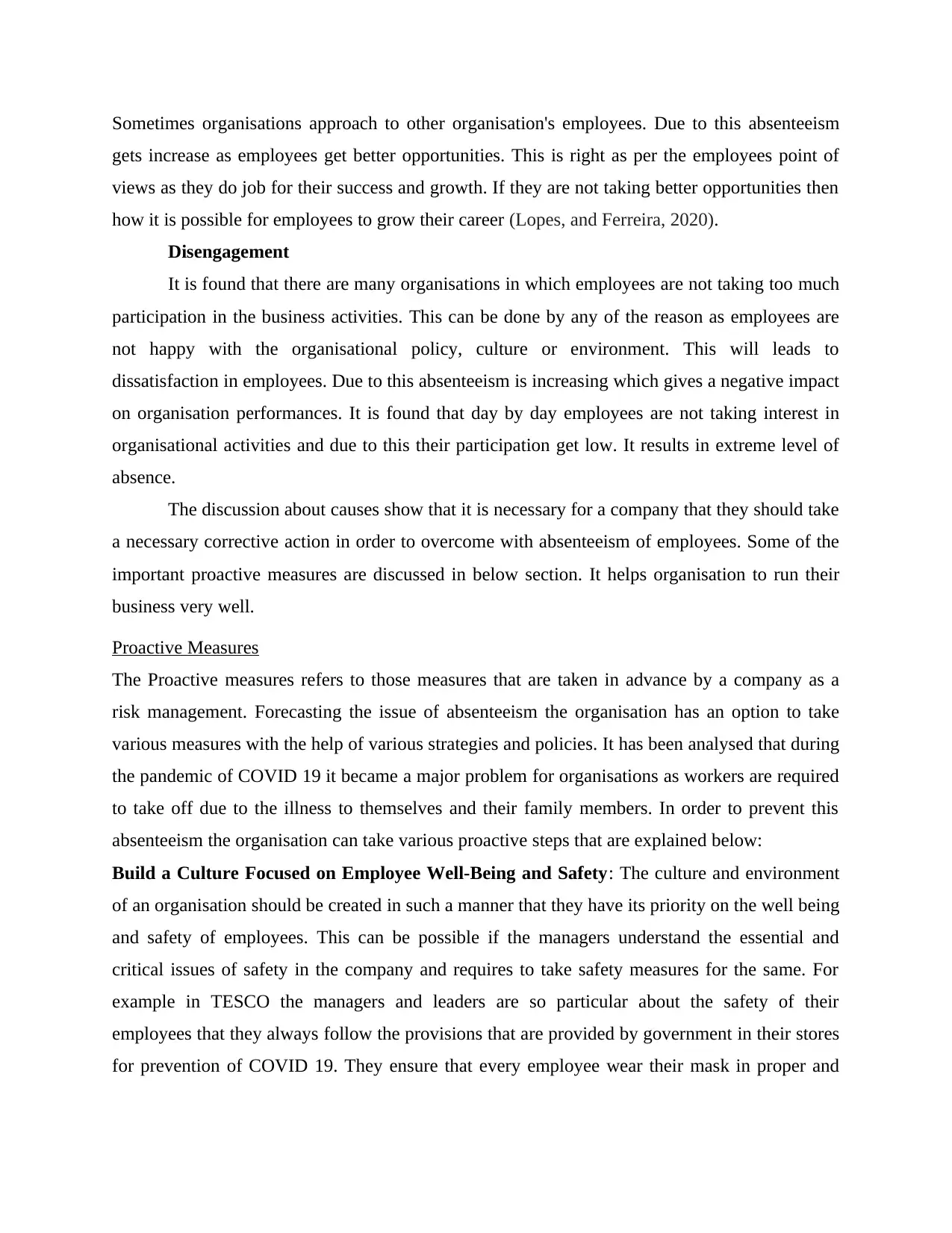
Sometimes organisations approach to other organisation's employees. Due to this absenteeism
gets increase as employees get better opportunities. This is right as per the employees point of
views as they do job for their success and growth. If they are not taking better opportunities then
how it is possible for employees to grow their career (Lopes, and Ferreira, 2020).
Disengagement
It is found that there are many organisations in which employees are not taking too much
participation in the business activities. This can be done by any of the reason as employees are
not happy with the organisational policy, culture or environment. This will leads to
dissatisfaction in employees. Due to this absenteeism is increasing which gives a negative impact
on organisation performances. It is found that day by day employees are not taking interest in
organisational activities and due to this their participation get low. It results in extreme level of
absence.
The discussion about causes show that it is necessary for a company that they should take
a necessary corrective action in order to overcome with absenteeism of employees. Some of the
important proactive measures are discussed in below section. It helps organisation to run their
business very well.
Proactive Measures
The Proactive measures refers to those measures that are taken in advance by a company as a
risk management. Forecasting the issue of absenteeism the organisation has an option to take
various measures with the help of various strategies and policies. It has been analysed that during
the pandemic of COVID 19 it became a major problem for organisations as workers are required
to take off due to the illness to themselves and their family members. In order to prevent this
absenteeism the organisation can take various proactive steps that are explained below:
Build a Culture Focused on Employee Well-Being and Safety: The culture and environment
of an organisation should be created in such a manner that they have its priority on the well being
and safety of employees. This can be possible if the managers understand the essential and
critical issues of safety in the company and requires to take safety measures for the same. For
example in TESCO the managers and leaders are so particular about the safety of their
employees that they always follow the provisions that are provided by government in their stores
for prevention of COVID 19. They ensure that every employee wear their mask in proper and
gets increase as employees get better opportunities. This is right as per the employees point of
views as they do job for their success and growth. If they are not taking better opportunities then
how it is possible for employees to grow their career (Lopes, and Ferreira, 2020).
Disengagement
It is found that there are many organisations in which employees are not taking too much
participation in the business activities. This can be done by any of the reason as employees are
not happy with the organisational policy, culture or environment. This will leads to
dissatisfaction in employees. Due to this absenteeism is increasing which gives a negative impact
on organisation performances. It is found that day by day employees are not taking interest in
organisational activities and due to this their participation get low. It results in extreme level of
absence.
The discussion about causes show that it is necessary for a company that they should take
a necessary corrective action in order to overcome with absenteeism of employees. Some of the
important proactive measures are discussed in below section. It helps organisation to run their
business very well.
Proactive Measures
The Proactive measures refers to those measures that are taken in advance by a company as a
risk management. Forecasting the issue of absenteeism the organisation has an option to take
various measures with the help of various strategies and policies. It has been analysed that during
the pandemic of COVID 19 it became a major problem for organisations as workers are required
to take off due to the illness to themselves and their family members. In order to prevent this
absenteeism the organisation can take various proactive steps that are explained below:
Build a Culture Focused on Employee Well-Being and Safety: The culture and environment
of an organisation should be created in such a manner that they have its priority on the well being
and safety of employees. This can be possible if the managers understand the essential and
critical issues of safety in the company and requires to take safety measures for the same. For
example in TESCO the managers and leaders are so particular about the safety of their
employees that they always follow the provisions that are provided by government in their stores
for prevention of COVID 19. They ensure that every employee wear their mask in proper and
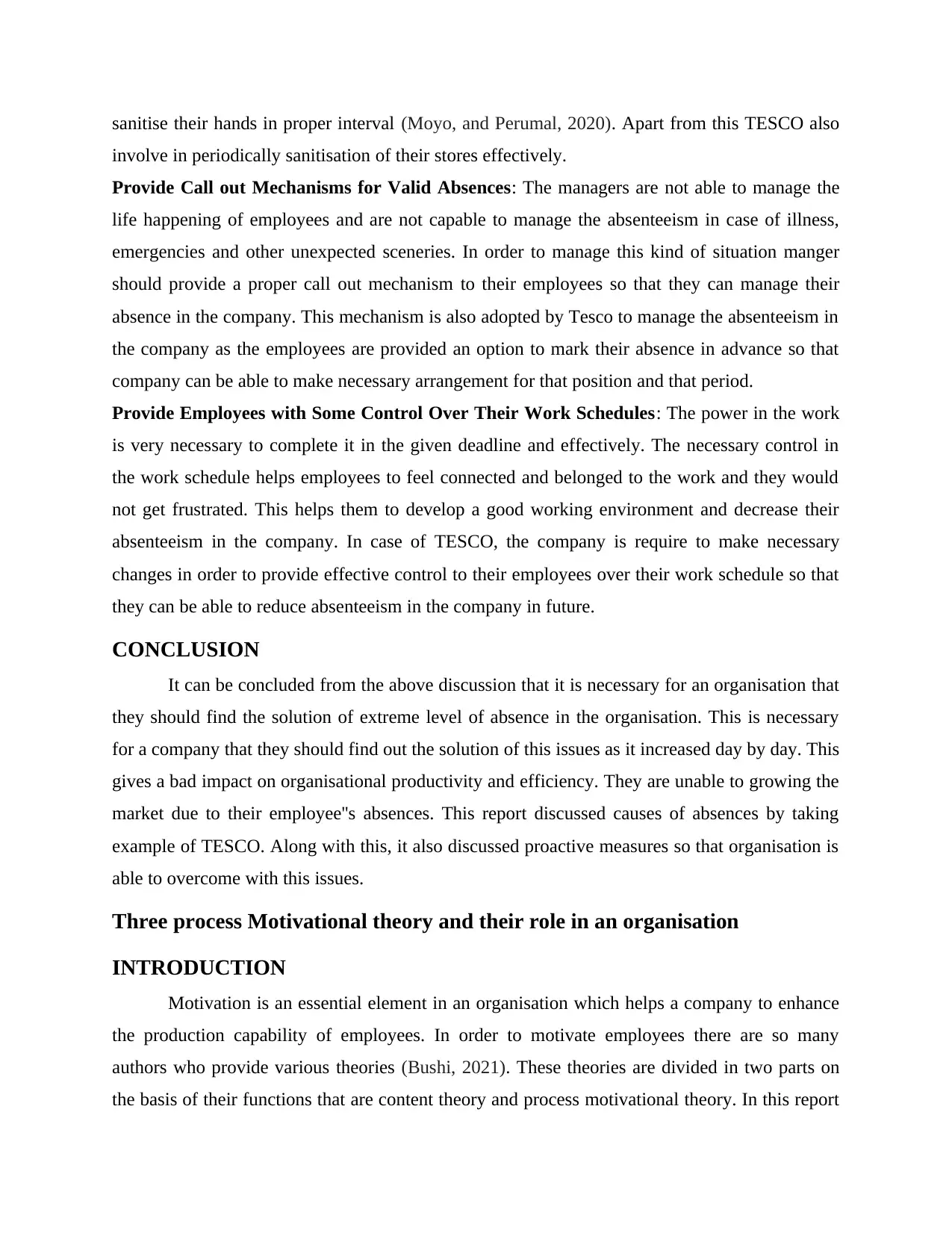
sanitise their hands in proper interval (Moyo, and Perumal, 2020). Apart from this TESCO also
involve in periodically sanitisation of their stores effectively.
Provide Call out Mechanisms for Valid Absences: The managers are not able to manage the
life happening of employees and are not capable to manage the absenteeism in case of illness,
emergencies and other unexpected sceneries. In order to manage this kind of situation manger
should provide a proper call out mechanism to their employees so that they can manage their
absence in the company. This mechanism is also adopted by Tesco to manage the absenteeism in
the company as the employees are provided an option to mark their absence in advance so that
company can be able to make necessary arrangement for that position and that period.
Provide Employees with Some Control Over Their Work Schedules: The power in the work
is very necessary to complete it in the given deadline and effectively. The necessary control in
the work schedule helps employees to feel connected and belonged to the work and they would
not get frustrated. This helps them to develop a good working environment and decrease their
absenteeism in the company. In case of TESCO, the company is require to make necessary
changes in order to provide effective control to their employees over their work schedule so that
they can be able to reduce absenteeism in the company in future.
CONCLUSION
It can be concluded from the above discussion that it is necessary for an organisation that
they should find the solution of extreme level of absence in the organisation. This is necessary
for a company that they should find out the solution of this issues as it increased day by day. This
gives a bad impact on organisational productivity and efficiency. They are unable to growing the
market due to their employee''s absences. This report discussed causes of absences by taking
example of TESCO. Along with this, it also discussed proactive measures so that organisation is
able to overcome with this issues.
Three process Motivational theory and their role in an organisation
INTRODUCTION
Motivation is an essential element in an organisation which helps a company to enhance
the production capability of employees. In order to motivate employees there are so many
authors who provide various theories (Bushi, 2021). These theories are divided in two parts on
the basis of their functions that are content theory and process motivational theory. In this report
involve in periodically sanitisation of their stores effectively.
Provide Call out Mechanisms for Valid Absences: The managers are not able to manage the
life happening of employees and are not capable to manage the absenteeism in case of illness,
emergencies and other unexpected sceneries. In order to manage this kind of situation manger
should provide a proper call out mechanism to their employees so that they can manage their
absence in the company. This mechanism is also adopted by Tesco to manage the absenteeism in
the company as the employees are provided an option to mark their absence in advance so that
company can be able to make necessary arrangement for that position and that period.
Provide Employees with Some Control Over Their Work Schedules: The power in the work
is very necessary to complete it in the given deadline and effectively. The necessary control in
the work schedule helps employees to feel connected and belonged to the work and they would
not get frustrated. This helps them to develop a good working environment and decrease their
absenteeism in the company. In case of TESCO, the company is require to make necessary
changes in order to provide effective control to their employees over their work schedule so that
they can be able to reduce absenteeism in the company in future.
CONCLUSION
It can be concluded from the above discussion that it is necessary for an organisation that
they should find the solution of extreme level of absence in the organisation. This is necessary
for a company that they should find out the solution of this issues as it increased day by day. This
gives a bad impact on organisational productivity and efficiency. They are unable to growing the
market due to their employee''s absences. This report discussed causes of absences by taking
example of TESCO. Along with this, it also discussed proactive measures so that organisation is
able to overcome with this issues.
Three process Motivational theory and their role in an organisation
INTRODUCTION
Motivation is an essential element in an organisation which helps a company to enhance
the production capability of employees. In order to motivate employees there are so many
authors who provide various theories (Bushi, 2021). These theories are divided in two parts on
the basis of their functions that are content theory and process motivational theory. In this report
⊘ This is a preview!⊘
Do you want full access?
Subscribe today to unlock all pages.

Trusted by 1+ million students worldwide
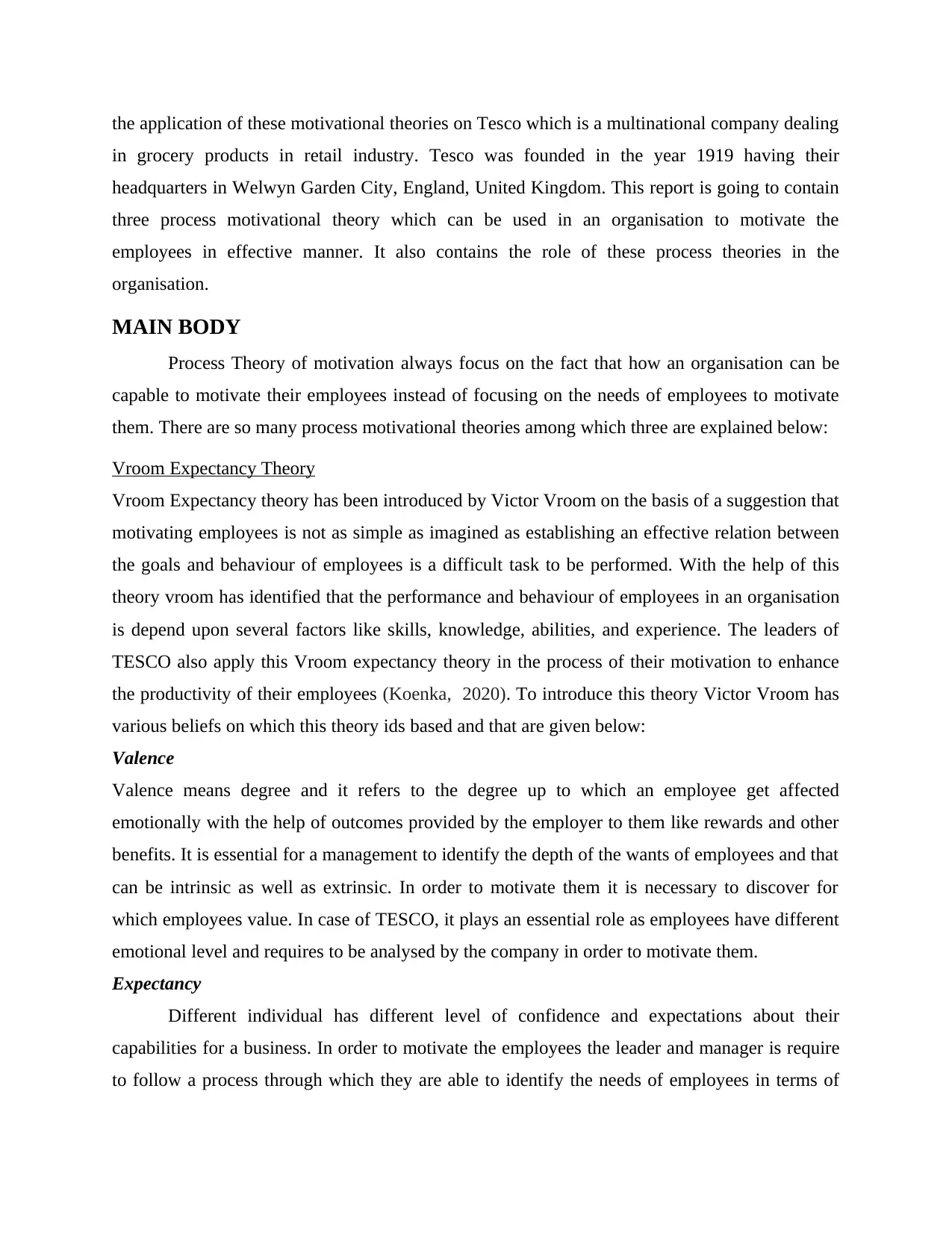
the application of these motivational theories on Tesco which is a multinational company dealing
in grocery products in retail industry. Tesco was founded in the year 1919 having their
headquarters in Welwyn Garden City, England, United Kingdom. This report is going to contain
three process motivational theory which can be used in an organisation to motivate the
employees in effective manner. It also contains the role of these process theories in the
organisation.
MAIN BODY
Process Theory of motivation always focus on the fact that how an organisation can be
capable to motivate their employees instead of focusing on the needs of employees to motivate
them. There are so many process motivational theories among which three are explained below:
Vroom Expectancy Theory
Vroom Expectancy theory has been introduced by Victor Vroom on the basis of a suggestion that
motivating employees is not as simple as imagined as establishing an effective relation between
the goals and behaviour of employees is a difficult task to be performed. With the help of this
theory vroom has identified that the performance and behaviour of employees in an organisation
is depend upon several factors like skills, knowledge, abilities, and experience. The leaders of
TESCO also apply this Vroom expectancy theory in the process of their motivation to enhance
the productivity of their employees (Koenka, 2020). To introduce this theory Victor Vroom has
various beliefs on which this theory ids based and that are given below:
Valence
Valence means degree and it refers to the degree up to which an employee get affected
emotionally with the help of outcomes provided by the employer to them like rewards and other
benefits. It is essential for a management to identify the depth of the wants of employees and that
can be intrinsic as well as extrinsic. In order to motivate them it is necessary to discover for
which employees value. In case of TESCO, it plays an essential role as employees have different
emotional level and requires to be analysed by the company in order to motivate them.
Expectancy
Different individual has different level of confidence and expectations about their
capabilities for a business. In order to motivate the employees the leader and manager is require
to follow a process through which they are able to identify the needs of employees in terms of
in grocery products in retail industry. Tesco was founded in the year 1919 having their
headquarters in Welwyn Garden City, England, United Kingdom. This report is going to contain
three process motivational theory which can be used in an organisation to motivate the
employees in effective manner. It also contains the role of these process theories in the
organisation.
MAIN BODY
Process Theory of motivation always focus on the fact that how an organisation can be
capable to motivate their employees instead of focusing on the needs of employees to motivate
them. There are so many process motivational theories among which three are explained below:
Vroom Expectancy Theory
Vroom Expectancy theory has been introduced by Victor Vroom on the basis of a suggestion that
motivating employees is not as simple as imagined as establishing an effective relation between
the goals and behaviour of employees is a difficult task to be performed. With the help of this
theory vroom has identified that the performance and behaviour of employees in an organisation
is depend upon several factors like skills, knowledge, abilities, and experience. The leaders of
TESCO also apply this Vroom expectancy theory in the process of their motivation to enhance
the productivity of their employees (Koenka, 2020). To introduce this theory Victor Vroom has
various beliefs on which this theory ids based and that are given below:
Valence
Valence means degree and it refers to the degree up to which an employee get affected
emotionally with the help of outcomes provided by the employer to them like rewards and other
benefits. It is essential for a management to identify the depth of the wants of employees and that
can be intrinsic as well as extrinsic. In order to motivate them it is necessary to discover for
which employees value. In case of TESCO, it plays an essential role as employees have different
emotional level and requires to be analysed by the company in order to motivate them.
Expectancy
Different individual has different level of confidence and expectations about their
capabilities for a business. In order to motivate the employees the leader and manager is require
to follow a process through which they are able to identify the needs of employees in terms of
Paraphrase This Document
Need a fresh take? Get an instant paraphrase of this document with our AI Paraphraser
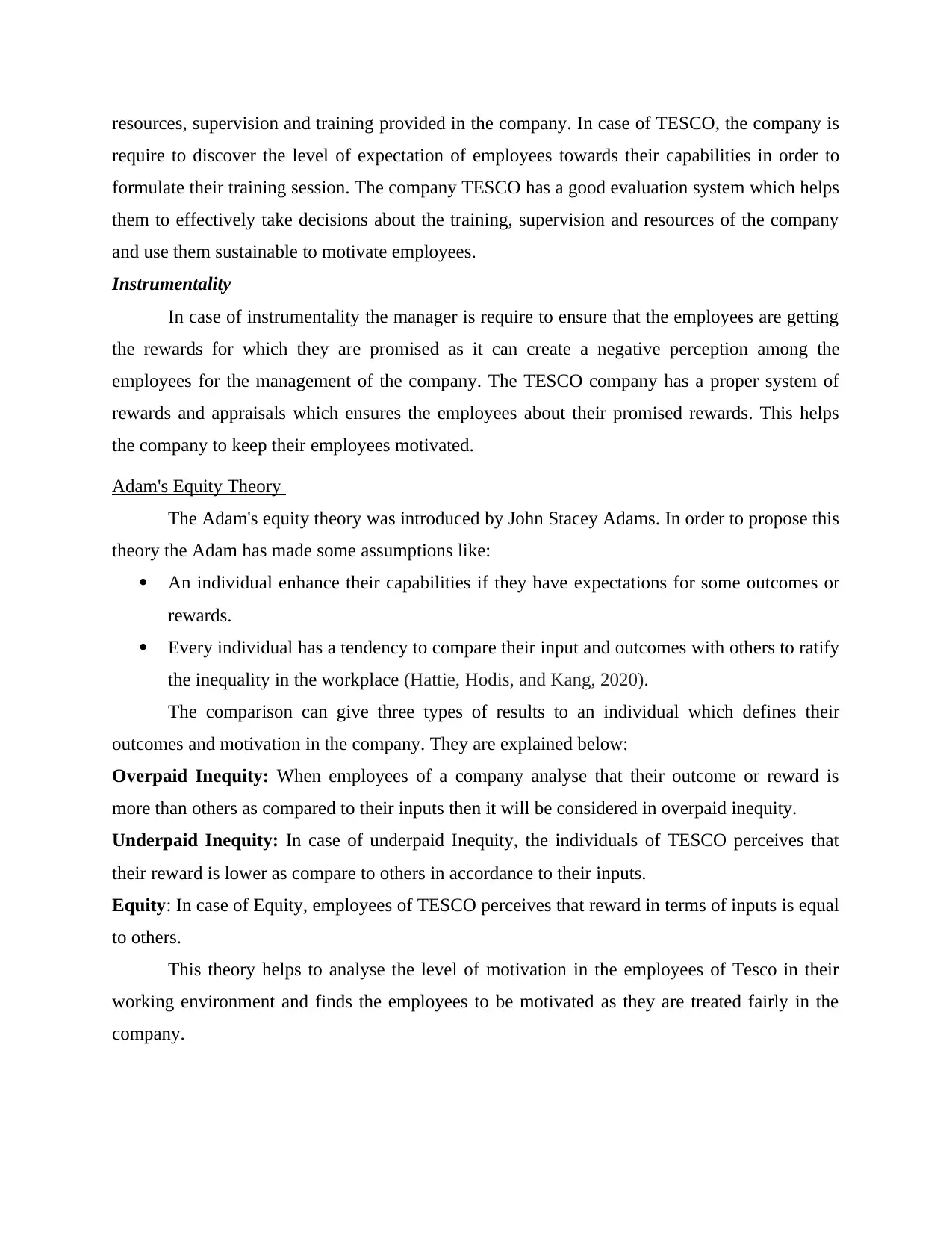
resources, supervision and training provided in the company. In case of TESCO, the company is
require to discover the level of expectation of employees towards their capabilities in order to
formulate their training session. The company TESCO has a good evaluation system which helps
them to effectively take decisions about the training, supervision and resources of the company
and use them sustainable to motivate employees.
Instrumentality
In case of instrumentality the manager is require to ensure that the employees are getting
the rewards for which they are promised as it can create a negative perception among the
employees for the management of the company. The TESCO company has a proper system of
rewards and appraisals which ensures the employees about their promised rewards. This helps
the company to keep their employees motivated.
Adam's Equity Theory
The Adam's equity theory was introduced by John Stacey Adams. In order to propose this
theory the Adam has made some assumptions like:
An individual enhance their capabilities if they have expectations for some outcomes or
rewards.
Every individual has a tendency to compare their input and outcomes with others to ratify
the inequality in the workplace (Hattie, Hodis, and Kang, 2020).
The comparison can give three types of results to an individual which defines their
outcomes and motivation in the company. They are explained below:
Overpaid Inequity: When employees of a company analyse that their outcome or reward is
more than others as compared to their inputs then it will be considered in overpaid inequity.
Underpaid Inequity: In case of underpaid Inequity, the individuals of TESCO perceives that
their reward is lower as compare to others in accordance to their inputs.
Equity: In case of Equity, employees of TESCO perceives that reward in terms of inputs is equal
to others.
This theory helps to analyse the level of motivation in the employees of Tesco in their
working environment and finds the employees to be motivated as they are treated fairly in the
company.
require to discover the level of expectation of employees towards their capabilities in order to
formulate their training session. The company TESCO has a good evaluation system which helps
them to effectively take decisions about the training, supervision and resources of the company
and use them sustainable to motivate employees.
Instrumentality
In case of instrumentality the manager is require to ensure that the employees are getting
the rewards for which they are promised as it can create a negative perception among the
employees for the management of the company. The TESCO company has a proper system of
rewards and appraisals which ensures the employees about their promised rewards. This helps
the company to keep their employees motivated.
Adam's Equity Theory
The Adam's equity theory was introduced by John Stacey Adams. In order to propose this
theory the Adam has made some assumptions like:
An individual enhance their capabilities if they have expectations for some outcomes or
rewards.
Every individual has a tendency to compare their input and outcomes with others to ratify
the inequality in the workplace (Hattie, Hodis, and Kang, 2020).
The comparison can give three types of results to an individual which defines their
outcomes and motivation in the company. They are explained below:
Overpaid Inequity: When employees of a company analyse that their outcome or reward is
more than others as compared to their inputs then it will be considered in overpaid inequity.
Underpaid Inequity: In case of underpaid Inequity, the individuals of TESCO perceives that
their reward is lower as compare to others in accordance to their inputs.
Equity: In case of Equity, employees of TESCO perceives that reward in terms of inputs is equal
to others.
This theory helps to analyse the level of motivation in the employees of Tesco in their
working environment and finds the employees to be motivated as they are treated fairly in the
company.
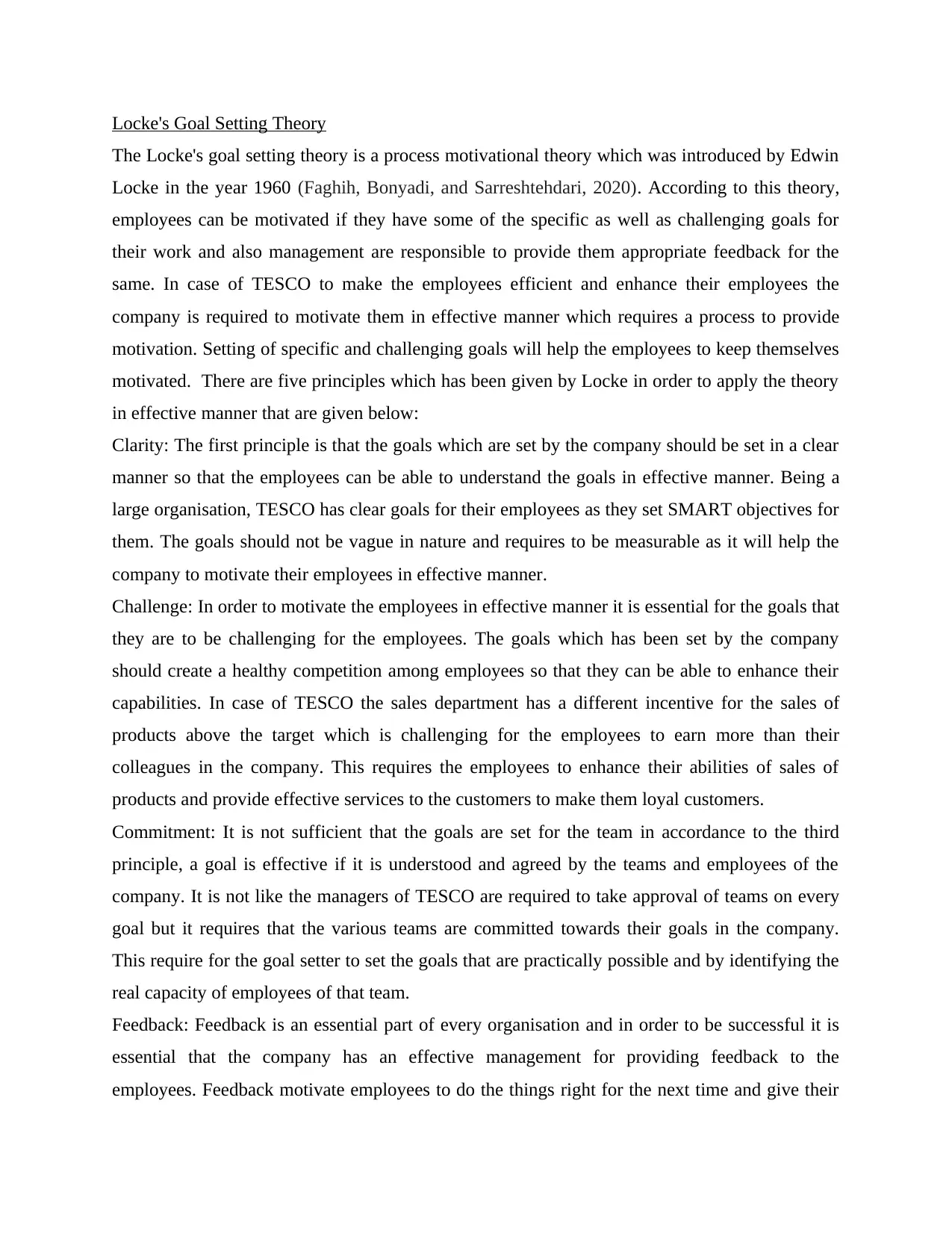
Locke's Goal Setting Theory
The Locke's goal setting theory is a process motivational theory which was introduced by Edwin
Locke in the year 1960 (Faghih, Bonyadi, and Sarreshtehdari, 2020). According to this theory,
employees can be motivated if they have some of the specific as well as challenging goals for
their work and also management are responsible to provide them appropriate feedback for the
same. In case of TESCO to make the employees efficient and enhance their employees the
company is required to motivate them in effective manner which requires a process to provide
motivation. Setting of specific and challenging goals will help the employees to keep themselves
motivated. There are five principles which has been given by Locke in order to apply the theory
in effective manner that are given below:
Clarity: The first principle is that the goals which are set by the company should be set in a clear
manner so that the employees can be able to understand the goals in effective manner. Being a
large organisation, TESCO has clear goals for their employees as they set SMART objectives for
them. The goals should not be vague in nature and requires to be measurable as it will help the
company to motivate their employees in effective manner.
Challenge: In order to motivate the employees in effective manner it is essential for the goals that
they are to be challenging for the employees. The goals which has been set by the company
should create a healthy competition among employees so that they can be able to enhance their
capabilities. In case of TESCO the sales department has a different incentive for the sales of
products above the target which is challenging for the employees to earn more than their
colleagues in the company. This requires the employees to enhance their abilities of sales of
products and provide effective services to the customers to make them loyal customers.
Commitment: It is not sufficient that the goals are set for the team in accordance to the third
principle, a goal is effective if it is understood and agreed by the teams and employees of the
company. It is not like the managers of TESCO are required to take approval of teams on every
goal but it requires that the various teams are committed towards their goals in the company.
This require for the goal setter to set the goals that are practically possible and by identifying the
real capacity of employees of that team.
Feedback: Feedback is an essential part of every organisation and in order to be successful it is
essential that the company has an effective management for providing feedback to the
employees. Feedback motivate employees to do the things right for the next time and give their
The Locke's goal setting theory is a process motivational theory which was introduced by Edwin
Locke in the year 1960 (Faghih, Bonyadi, and Sarreshtehdari, 2020). According to this theory,
employees can be motivated if they have some of the specific as well as challenging goals for
their work and also management are responsible to provide them appropriate feedback for the
same. In case of TESCO to make the employees efficient and enhance their employees the
company is required to motivate them in effective manner which requires a process to provide
motivation. Setting of specific and challenging goals will help the employees to keep themselves
motivated. There are five principles which has been given by Locke in order to apply the theory
in effective manner that are given below:
Clarity: The first principle is that the goals which are set by the company should be set in a clear
manner so that the employees can be able to understand the goals in effective manner. Being a
large organisation, TESCO has clear goals for their employees as they set SMART objectives for
them. The goals should not be vague in nature and requires to be measurable as it will help the
company to motivate their employees in effective manner.
Challenge: In order to motivate the employees in effective manner it is essential for the goals that
they are to be challenging for the employees. The goals which has been set by the company
should create a healthy competition among employees so that they can be able to enhance their
capabilities. In case of TESCO the sales department has a different incentive for the sales of
products above the target which is challenging for the employees to earn more than their
colleagues in the company. This requires the employees to enhance their abilities of sales of
products and provide effective services to the customers to make them loyal customers.
Commitment: It is not sufficient that the goals are set for the team in accordance to the third
principle, a goal is effective if it is understood and agreed by the teams and employees of the
company. It is not like the managers of TESCO are required to take approval of teams on every
goal but it requires that the various teams are committed towards their goals in the company.
This require for the goal setter to set the goals that are practically possible and by identifying the
real capacity of employees of that team.
Feedback: Feedback is an essential part of every organisation and in order to be successful it is
essential that the company has an effective management for providing feedback to the
employees. Feedback motivate employees to do the things right for the next time and give their
⊘ This is a preview!⊘
Do you want full access?
Subscribe today to unlock all pages.

Trusted by 1+ million students worldwide
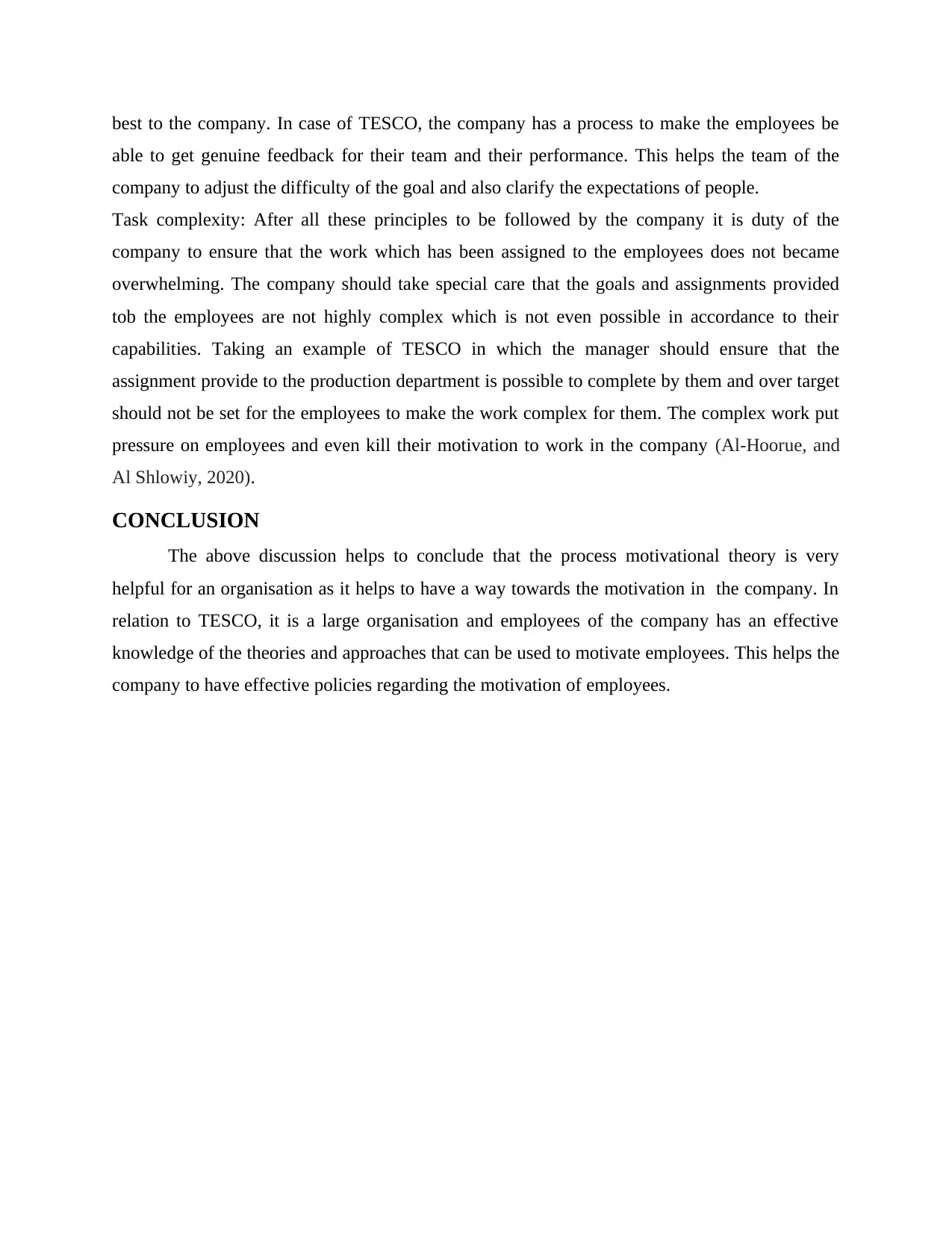
best to the company. In case of TESCO, the company has a process to make the employees be
able to get genuine feedback for their team and their performance. This helps the team of the
company to adjust the difficulty of the goal and also clarify the expectations of people.
Task complexity: After all these principles to be followed by the company it is duty of the
company to ensure that the work which has been assigned to the employees does not became
overwhelming. The company should take special care that the goals and assignments provided
tob the employees are not highly complex which is not even possible in accordance to their
capabilities. Taking an example of TESCO in which the manager should ensure that the
assignment provide to the production department is possible to complete by them and over target
should not be set for the employees to make the work complex for them. The complex work put
pressure on employees and even kill their motivation to work in the company (Al-Hoorue, and
Al Shlowiy, 2020).
CONCLUSION
The above discussion helps to conclude that the process motivational theory is very
helpful for an organisation as it helps to have a way towards the motivation in the company. In
relation to TESCO, it is a large organisation and employees of the company has an effective
knowledge of the theories and approaches that can be used to motivate employees. This helps the
company to have effective policies regarding the motivation of employees.
able to get genuine feedback for their team and their performance. This helps the team of the
company to adjust the difficulty of the goal and also clarify the expectations of people.
Task complexity: After all these principles to be followed by the company it is duty of the
company to ensure that the work which has been assigned to the employees does not became
overwhelming. The company should take special care that the goals and assignments provided
tob the employees are not highly complex which is not even possible in accordance to their
capabilities. Taking an example of TESCO in which the manager should ensure that the
assignment provide to the production department is possible to complete by them and over target
should not be set for the employees to make the work complex for them. The complex work put
pressure on employees and even kill their motivation to work in the company (Al-Hoorue, and
Al Shlowiy, 2020).
CONCLUSION
The above discussion helps to conclude that the process motivational theory is very
helpful for an organisation as it helps to have a way towards the motivation in the company. In
relation to TESCO, it is a large organisation and employees of the company has an effective
knowledge of the theories and approaches that can be used to motivate employees. This helps the
company to have effective policies regarding the motivation of employees.
Paraphrase This Document
Need a fresh take? Get an instant paraphrase of this document with our AI Paraphraser
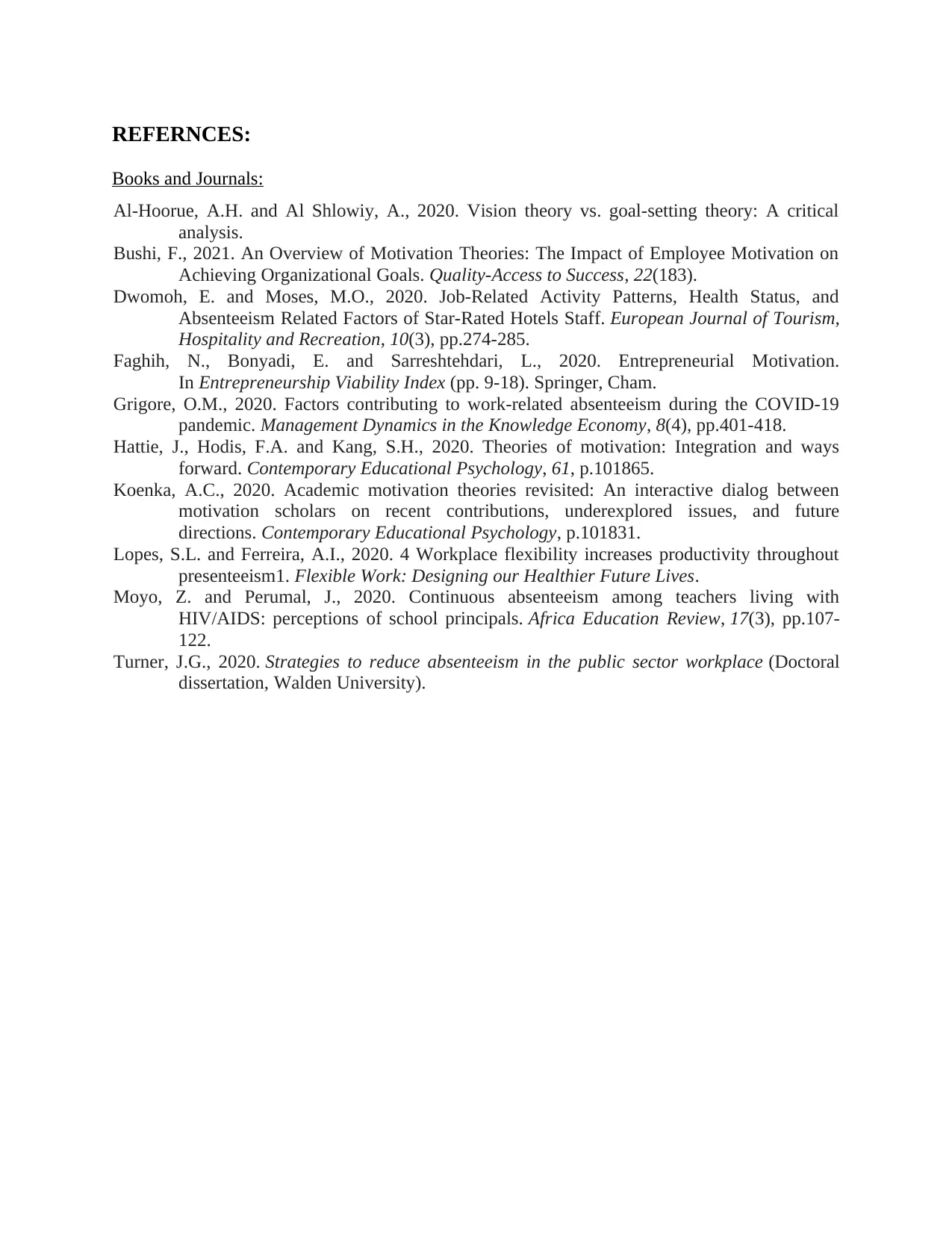
REFERNCES:
Books and Journals:
Al-Hoorue, A.H. and Al Shlowiy, A., 2020. Vision theory vs. goal-setting theory: A critical
analysis.
Bushi, F., 2021. An Overview of Motivation Theories: The Impact of Employee Motivation on
Achieving Organizational Goals. Quality-Access to Success, 22(183).
Dwomoh, E. and Moses, M.O., 2020. Job-Related Activity Patterns, Health Status, and
Absenteeism Related Factors of Star-Rated Hotels Staff. European Journal of Tourism,
Hospitality and Recreation, 10(3), pp.274-285.
Faghih, N., Bonyadi, E. and Sarreshtehdari, L., 2020. Entrepreneurial Motivation.
In Entrepreneurship Viability Index (pp. 9-18). Springer, Cham.
Grigore, O.M., 2020. Factors contributing to work-related absenteeism during the COVID-19
pandemic. Management Dynamics in the Knowledge Economy, 8(4), pp.401-418.
Hattie, J., Hodis, F.A. and Kang, S.H., 2020. Theories of motivation: Integration and ways
forward. Contemporary Educational Psychology, 61, p.101865.
Koenka, A.C., 2020. Academic motivation theories revisited: An interactive dialog between
motivation scholars on recent contributions, underexplored issues, and future
directions. Contemporary Educational Psychology, p.101831.
Lopes, S.L. and Ferreira, A.I., 2020. 4 Workplace flexibility increases productivity throughout
presenteeism1. Flexible Work: Designing our Healthier Future Lives.
Moyo, Z. and Perumal, J., 2020. Continuous absenteeism among teachers living with
HIV/AIDS: perceptions of school principals. Africa Education Review, 17(3), pp.107-
122.
Turner, J.G., 2020. Strategies to reduce absenteeism in the public sector workplace (Doctoral
dissertation, Walden University).
Books and Journals:
Al-Hoorue, A.H. and Al Shlowiy, A., 2020. Vision theory vs. goal-setting theory: A critical
analysis.
Bushi, F., 2021. An Overview of Motivation Theories: The Impact of Employee Motivation on
Achieving Organizational Goals. Quality-Access to Success, 22(183).
Dwomoh, E. and Moses, M.O., 2020. Job-Related Activity Patterns, Health Status, and
Absenteeism Related Factors of Star-Rated Hotels Staff. European Journal of Tourism,
Hospitality and Recreation, 10(3), pp.274-285.
Faghih, N., Bonyadi, E. and Sarreshtehdari, L., 2020. Entrepreneurial Motivation.
In Entrepreneurship Viability Index (pp. 9-18). Springer, Cham.
Grigore, O.M., 2020. Factors contributing to work-related absenteeism during the COVID-19
pandemic. Management Dynamics in the Knowledge Economy, 8(4), pp.401-418.
Hattie, J., Hodis, F.A. and Kang, S.H., 2020. Theories of motivation: Integration and ways
forward. Contemporary Educational Psychology, 61, p.101865.
Koenka, A.C., 2020. Academic motivation theories revisited: An interactive dialog between
motivation scholars on recent contributions, underexplored issues, and future
directions. Contemporary Educational Psychology, p.101831.
Lopes, S.L. and Ferreira, A.I., 2020. 4 Workplace flexibility increases productivity throughout
presenteeism1. Flexible Work: Designing our Healthier Future Lives.
Moyo, Z. and Perumal, J., 2020. Continuous absenteeism among teachers living with
HIV/AIDS: perceptions of school principals. Africa Education Review, 17(3), pp.107-
122.
Turner, J.G., 2020. Strategies to reduce absenteeism in the public sector workplace (Doctoral
dissertation, Walden University).
1 out of 11
Related Documents
Your All-in-One AI-Powered Toolkit for Academic Success.
+13062052269
info@desklib.com
Available 24*7 on WhatsApp / Email
![[object Object]](/_next/static/media/star-bottom.7253800d.svg)
Unlock your academic potential
Copyright © 2020–2026 A2Z Services. All Rights Reserved. Developed and managed by ZUCOL.





